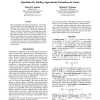132 search results - page 9 / 27 » Identifying Bullies with a Computer Game |
CHI
2005
ACM
14 years 10 months ago
2005
ACM
Immersion is recognised as an important element of good games. However, it is not always clear what is meant by immersion. Earlier work has identified possible barriers to immersi...
AAAI
2010
13 years 10 months ago
2010
Many computational problems in game theory, such as finding Nash equilibria, are algorithmically hard to solve. This limitation forces analysts to limit attention to restricted su...
GECCO
2003
Springer
14 years 2 months ago
2003
Springer
Abstract. Most modern real-time strategy computer games have a sophisticated but fixed ‘AI’ component that controls the computer’s actions. Once the user has learned how suc...
HAPTICS
2010
IEEE
14 years 2 months ago
2010
IEEE
Abstract. A new approach to teaching the skills used by health professionals during hands-on (palpation-based) examinations and procedures is reported, where students practice indi...
MUM
2004
ACM
14 years 3 months ago
2004
ACM
We present Road Rager, a prototype built in order to explore our hypothesis that proximity and a possibility to identify other players during temporary encounters could spur socia...


